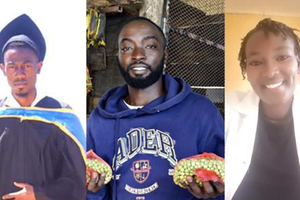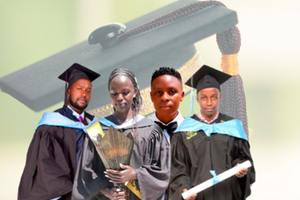
The American government will now scrutinise social media activity of foreign nationals who apply for US student visas.
If you plan to study in the US, the American government will scrutinise your social media activity before deciding whether to grant you a visa or not.
Thousands of Kenyan students apply for US student visas every year and will be affected by the new directive by US Secretary of State Marco Rubio to pause new visa interviews in an effort to tighten social media screening.
This could delay the processing of applications and leave families in distress, especially those who have already paid tuition deposits or turned down other opportunities. Mr Rubio last week instructed American embassies and consulates worldwide to cease scheduling student visa interviews while the US President Donald Trump’s administration considers more extensive vetting of applicants' social media profiles.
The academic calendar for most American universities and colleges start in September. Prospective Kenya students are likely to be affected, as they are among the most active users of social media in the world. Kenyans use social media for various purposes, such as consuming news, seeking entertainment, and engaging in activism.

The US government has previously taken action against students and even professors over social media posts.
According to the latest report by GlobalWebIndex, an audience research company, Kenyan internet users spend an average of about four hours on social media daily, surpassing the global average of two hours and 19 minutes.
This latest effort by the Trump administration to restrict international students’ entry to the US comes amid claims that they might promote antisemitism or otherwise threaten national security, and was laid out in a diplomatic cable.
The cable states that, “effective immediately, in preparation for an expansion of required social media screening and vetting, consular sections should not add any additional student or exchange visitor (F, M, and J) visa appointment capacity until further guidance is issued … in the coming days”.
According to the cable, details of which were first reported by Politico, previously scheduled interviews have not been affected and can proceed.
Read: It’s hiding time for Kenyans without papers in the US… but how did they find themselves there?
The cable states that, “in preparation for an increase in the required social media screening and vetting of student and exchange visitor visa applicants, consulate sections should not increase the number of appointments available for these types of visa until the relevant guidance has been issued”.
The pause will last “until further guidance is issued” over the next few days.
This comes just days after the Trump administration sought the records of international students from Harvard University. The government earlier imposed some social media screening requirements, but those were largely to check the returning students.
The State Department's directive did not elaborate on what type of extensive vetting the administration is planning, but it alluded to executive orders that are aimed at keeping out terrorists and battling antisemitism.
"It’s unclear, for example, whether posting photos of a Palestinian flag on an X account could force a student to undergo additional scrutiny," a Politico report said.
Actions have previously been taken against students and even professors over social media posts.
As part of the visa application process, international students who want to study in the US are typically required to schedule an interview at an American embassy or consulate, usually in their home country. Wait times vary widely: At most embassies, appointments for student visa interviews can be scheduled less than two months in advance, though some diplomatic posts have longer waiting times.
Foreign students who want to study in the US are usually required to schedule interviews at a US embassy in their home country before approval.
Students who apply will face non-refundable costs (SEVIS fees, flight bookings, tuition deposits) that could be wasted if delays stretch beyond deadlines.
Applicants must now submit handles or platforms (Facebook, X, WhatsApp, etc.) for review. Posts on politics, activism, or even humour may trigger red flags.
There will also be extended screening, and background checks could take weeks to months longer, especially for STEM students (engineering, AI, etc.).
Past visa rejections (or family members’ rejections) and "suspicious" online activity may lead to more refusals.
According to Visagrader.com, between 2018 and 2022, at least 5,725 F1 visas were approved and issued in Nairobi. Only 512 visas were in 2020.
In 2018, 65.03 per cent of the applicants were approved compared 34.97 rejections. While in 2023, 63.75 percent of the applicants got their visas while 36.25 percent were rejected.
In 2019, the Department of State updated its immigrant and non-immigrant visa application forms to request additional information, including social media identifiers from most US visa applicants worldwide. The update, which was initially announced in 2018 in the Federal Register, was announced keeping national security in mind, an official release had said.
"National security is our top priority when adjudicating visa applications, and every prospective traveller and immigrant to the United States undergoes extensive security screening. We are constantly working to find mechanisms to improve our screening processes to protect US citizens, while supporting legitimate travel to the United States," the release said then.
The State Department said collecting this additional information from visa applicants will strengthen their process for vetting these applicants and confirming their identity.
More than a million international students enrolled at U.S. institutions for the 2023-2024 academic year. That number already declined by 11 percent over the past year from March 2024 to 2025, and experts suggest it would likely shrink further under Trump’s new policies.
Rubio had signalled more restrictions on visa applicants and holders just last week.
“A visa is not a right, it’s a privilege,” Rubio said at a Senate Foreign Relations Committee hearing on May 20, noting that the State Department was going to “continue to revoke the visas of people who are here as guests and are disrupting our higher education”.
“If you tell me that you’re coming to the United States to lead campus crusades, to take over libraries and try to burn down buildings … we will deny you a visa,” he said.
Tuesday’s development comes days after the Department of Homeland Security sought to block Harvard University from enrolling foreign students due to what it described as non-compliance with its request to provide records of their activities on campus.
The move was halted by a federal judge on Friday after Harvard sued the administration.
Since the start of Trump’s second term, many international students – including those from China – have reported self-censoring on campus and taking other steps to avoid the administration’s scrutiny.
The US hosts more than a million international students, and in the 2023-2024 school year, over 270,000 of them were Chinese, according to the Institute of International Education.








